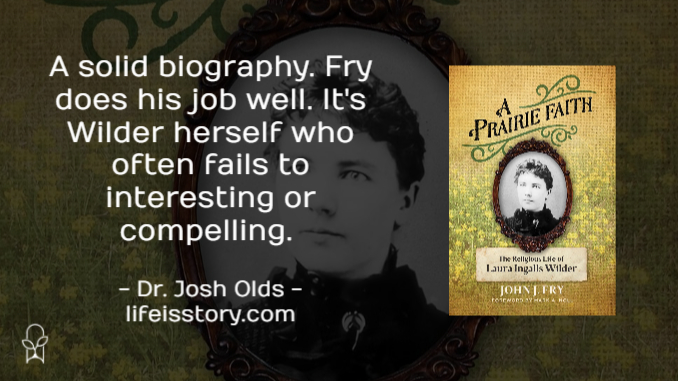
Series: Library of Religious Biography
Published by Eerdmans on February 6, 2024
Genres: Non-Fiction, Biography
Buy on Amazon
Goodreads

What role did Laura Ingalls Wilder’s Christian faith play in her life and writing?
The beloved Little Housebooks by Laura Ingalls Wilder have sold over 60 million copies since their publication in the first half of the twentieth century. Even her unpolished memoir, Pioneer Girl, which tells the true story behind the children’s books, was widely embraced upon its release in 2014. Despite Wilder’s enduring popularity, few fans know much about her Christian beliefs and practice.
John J. Fry shines a light on Wilder’s quiet faith in this unique biography. Fry surveys the Little Housebooks, Pioneer Girl, and Wilder’s lesser-known writings, including her letters, poems, and newspaper columns. Analyzing this wealth of sources, he reveals how Wilder’s down-to-earth faith and Christian morality influenced her life and work. Interweaving these investigations with Wilder’s perennially interesting life story, A Prairie Faith illustrates the Christian practices of pioneers and rural farmers during this dynamic period of American history.
Little House on the Prairie remains a cultural phenomenon ninety years after their publication and fifty years after the popular television show loosely based on the books. Over sixty million copies have been sold and the series, in particular, has held an appeal for white, conservative evangelicalism/fundamentalism for its libertarian political perspectives. Little House is billed as the story of Wilder’s childhood, but there’s still a lot we don’t know about her—particularly once that childhood was over.
A Prairie Faith steps in to fill that gap. John J. Fry, professor of history at Trinity Christian College, did his Ph.D. on Wilder and has an academic focus on the rural American West. That combination makes him the perfect person to offer a perspective on the historical Laura Ingalls Wilder, her religious life in particular. This book is part of the Library of Religious Biography, a series of history books meant to focus specifically on the religious lives of influential historical figures.
Fry arranges A Prairie Faith chronologically, moving from Wilder’s childhood through her later years. Along the way, he busts the myth that the Little House books were written as narrative memoirs and shows how strong of an influence Rose Wilder, Laura’s daughter, was on developing the narrative and themes of the books. To be perfectly candid, I had more of an interest and enjoyment in learning about the literary development of the Little House books than when the focus was on Wilder’s religious life.
And the reason for that, I think, is that there is not much extant writing or knowledge of Wilder’s religious life. Despite writing an entire series of books about her childhood and claiming them as non-fiction, Wilder lived a very private life. The Little House books aren’t heavy on religion (perhaps part of why they continue to have mainstream appeal) and Wilder’s religious life as an adult appears to be rather anemic and undocumented.
Wilder didn’t write much about religion, was not often a member of a church throughout her life, and never really expressed faith publicly in any strong way. A Prairie Faith’s conclusion summarizes it well: “Wilder’s unwillingness to write openly about her beliefs makes it difficult to describe them in detail.” The end result is that a lot of the book revolves around, not Laura’s religious life but the religious life surrounding her. This is informative and gives context to what faith was like on the prairie, but Wilder never feels like an essential character in the discussion.
None of this is Fry’s fault, who faithfully mines the contextual depths of Wilder’s life to construct her religious setting and take readers into the type of faith Wilder would have experienced. As a work of history, it is thorough, comprehensive, and readable. But if readers are coming to this as a biography of Wilder or hoping to learn from her religious life, I think they will be disappointed. The truth is that—partially because of the Little House books and partially because of fundamentalism’s affinity for the book’s politics—Wilder has been idealized as a figure she is not. I would love to read a book that dives into the sociological hows and whys of her books capturing religious homeschool communities and how she has transformed, in that culture, from a mainline Protestant to a fundamentalist.
Overall, though, this is a solid biography. Fry does his job. It’s Wilder herself who often fails to capture attention or provide anything novel or interesting—which is why I suppose the books about her life were embellished. My key takeaway from this book was the stark contrast between Wilder the person and Wilder the character and how little we really know about the religious life of Laura Ingalls Wilder.
